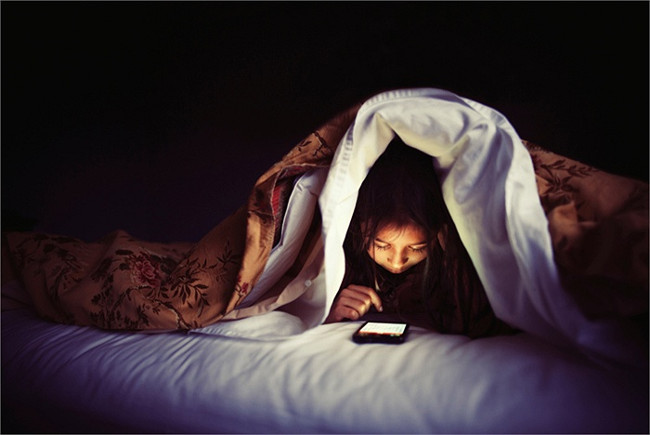6 health questions related to the screen
Using improperly screened PC, TV, smartphone . may affect vision, reduce sleep quality, but do not cause cancer, diabetes or depression.
Screen light reduces sleep quality?
Right answer
In everyday life, we are constantly exposed to high-energy "green light" which is the continuous light emitted from devices such as computer monitors, TVs, smartphones, tablets or LEDs.
According to the study, blue light is the cause of eye fatigue, nearsightedness, macular degeneration and sleep disorders. In general, artificial lighting from electrical and electronic devices and digital device screens has a direct impact on sleep quality as well as sleep time.

Natural sleep cycles (also known as our body's circadian rhythms) will be broken by artificial light, especially light in the blue to white area of the spectrum. Warmer tones like yellow and orange also affect sleep quality, but not as much as cold tones.
Using devices with glowing screens before going to bed will break your biological rhythm by fooling the brain into believing it is natural daylight. This will hinder the production of melatonin, which is a stimulating endogenous hormone that leads to sleepiness and falls asleep at night. According to some tests, if turning the blue light of the screen into orange-yellow light, it could actually help you sleep better at night.
In addition, some of the screen manufacturers today have incorporated the light-green minimalist technologies into their products to give users the best comfort and protection. Specifically, these technologies help reduce the amount of green light emitted, accompanied by an anti-dazzle and anti-flicker technology integrated so that users can get the best experience, protect the eyes while working. or entertainment.
- 10 reasons why smartphones negatively affect your health
- Some simple stress relief and eye relaxation exercises
Does the screen affect vision?
Right answer
Most ophthalmologists recommend that spending too much time focusing on a computer screen or TV is not a good habit for your eyes. Currently, two dangerous eye diseases caused by blue light from the screen cause harm can be the screen vision syndrome and macular degeneration (also known as macular degeneration).
The cornea (placed in front of the eye) is a transparent protective layer that protects the eye, pupil, and anterior chamber of the eye. Light passing through the cornea and pupils before reaching the lens can accumulate in the retina.
Green light carries a lot of energy in the narrow band 415 - 455nm, causing more damage to the eyes, namely lens and retina. Green bands of the spectrum carry more energy and can go straight through the eye - causing nearsightedness and macular degeneration, which is one of the leading causes of blindness.
Basically, watching TV or working with a computer screen is much more stressful than reading. This relates to the scanning frequency of the lamp. Low-frequency screens are easy to cause eyestrain, because the human eye sees images blinking constantly, especially previous CRT technology screens. But with LCD or LED screens today, the problem has been overcome thanks to the very high frequency that makes the eyes no longer blinking and the light of the screen is normal light without negative rays like CRT too.
According to the natural law, normal human eyes are adaptable to the ability to look far away because when the eyes do not need regulation, the eyes must be close, so it cannot be sustained. Looking at it for a long time, with few blinks and unsuitable light, the lens is too long to stretch, when it needs to stretch it does not relax like it is (like a broken spring). This situation repeated continuously over many days and months, eventually leading to loss of vision. That is the cause of myopia.

Another reason that the screen is more harmful to the eyes is the light and contrast factor. People who use computers or watch TV often do not notice whether the brightness and contrast of the screen is suitable for their eyes, with the light of the room or not.
Sitting too close to the screen affects the eyes?
Answer: Not true
One thing is certain: if you look too close to the screen - whether a computer screen, a TV or a mobile device screen - can cause eye strain, headache, blurred vision and even nausea. However, scientists believe that the real problems of these symptoms are related to the perspective, sitting posture, shoulders and neck. The distance from the eye to the screen does not directly affect the above symptoms.
Many people worry that sitting too close to the computer screen or the TV will damage the eyes in the long run. However, scientists have shown that monitors do not pose a risk of permanent eye damage. The truth is that it doesn't matter how close or far you sit, but how to sit. The position of sitting close to or far depends on the eyesight of each person.
When working with computers, note the upright position, the eyes facing the screen directly, the center of the screen should be at breast height. Do not sit and work in front of the computer or watch TV for too long, sometimes take a break, get up and relax before continuing.
Using the screen in the dark is easy to damage the eyes?
Right answer
Perhaps everyone knows that using a computer, smartphone, tablet or watching TV in the dark will make your eyes tired because you have to regulate the brightness of the screen and the surrounding darkness. There have been many cases of users being diagnosed with eye cancer due to the habit of using the phone at night when turning off the lights to sleep.

This action prolongs the eye with macular degeneration, leading to a rapid decline in vision, signs of eye cancer. Green light from the screen can cause death of cells in the human retina, greatly affecting vision. Using the device in low light for too long allows the electron beams to direct directly into the eyes, causing prolonged dryness of the eye conjunctiva, leading to eye cancer and blindness.
According to experts, if used for a long time, you should sit in a bright room and preferably a place with natural light. Besides, you should know that most devices equipped with electronic displays today such as TVs, laptops, smartphones, tablets have automatic feature to adjust the screen brightness to suit the surrounding environment so you No more worries when using the device in the dark. However, it is necessary to limit such use continuously for a long time, but only when it is absolutely necessary.
- Put your phone down and feel the world around you
Screen is the cause of diabetes and depression?
Answer: Not true
It can be said that those who spend a lot of time sitting in front of a computer are actually at higher risk of diseases such as obesity, diabetes and depression. However, monitors are not the main cause of these diseases. It can be a combination of lifestyle, changes in habits in everyday life.
Scientifically, if you have less activity and more sitting (working on paperwork, watching TV, not necessarily sitting in front of a computer screen), you will definitely gain weight. If you gain weight, you will have many health problems. People who are overweight tend to have diabetes, depression, anxiety and even mental illness.
Science has also proven that there are many ways to improve health even if your job requires hours of computer work every day. Computers are not the cause of diabetes and depression. Just spending a few minutes relaxing your body after every hour of stressful work can greatly affect your health. In addition, a healthy diet as well as a rest and recreation will help us stay healthy.
Can the screen cause cancer?
Answer: Not true
Just like in the example above, this is again an attempt to find the cause for the common diseases of lifestyle changes that have occurred in today's technological age. In recent years, many scientific empirical studies with finishing methods have been implemented, but no program has yet to prove the link between screen use and life-threatening diseases. like cancer.
While these studies show that people who spend a lot of time sitting in front of a TV or computer screen are at higher risk of cancer, these studies ignore complementary factors such as the environment. living, living habits and many other problems.
In fact, there are dozens or even hundreds of causes of cancer cases, not just computer screens. So far, no studies have demonstrated this, so we cannot conclude that the screen is the main cause of cancer.